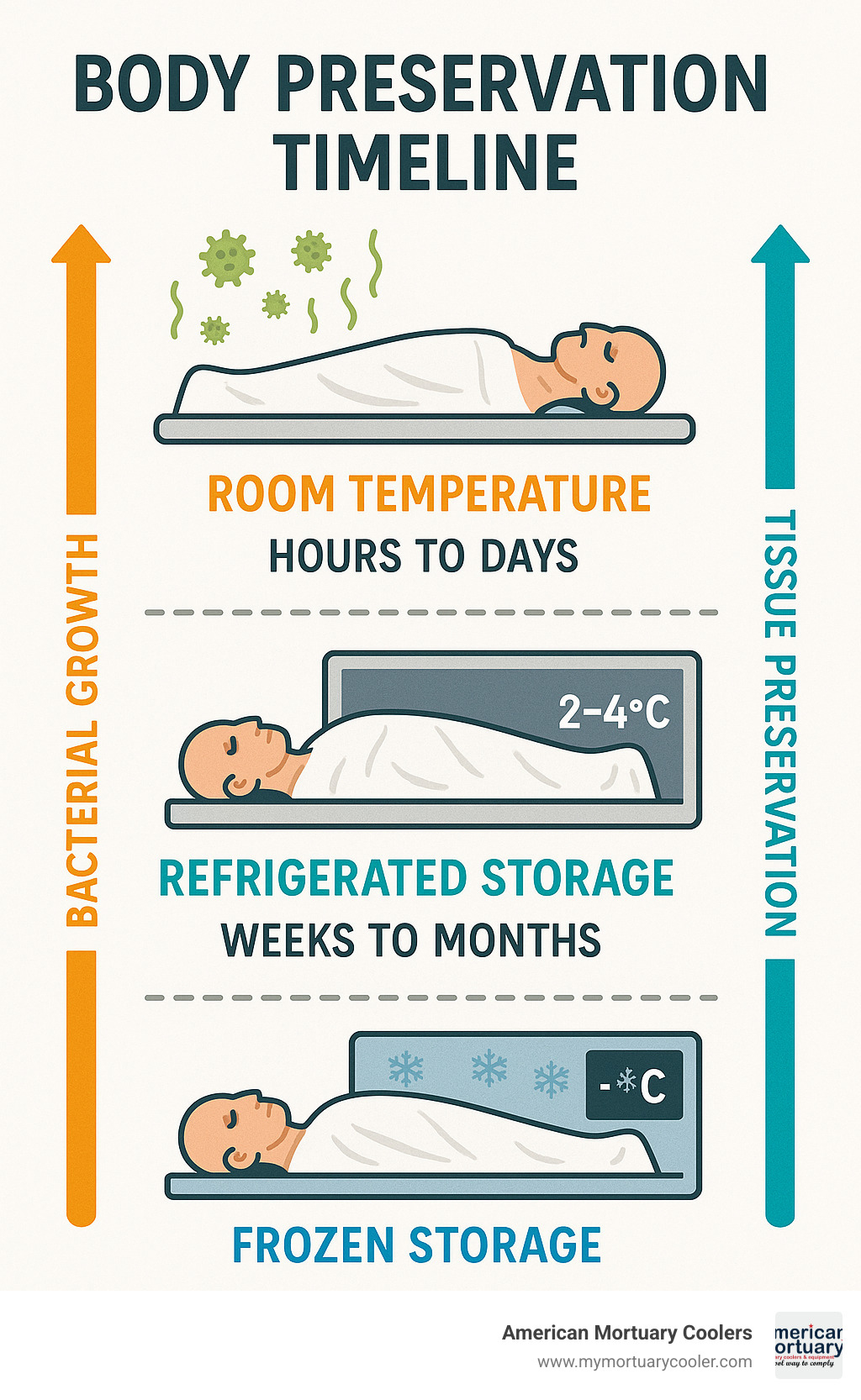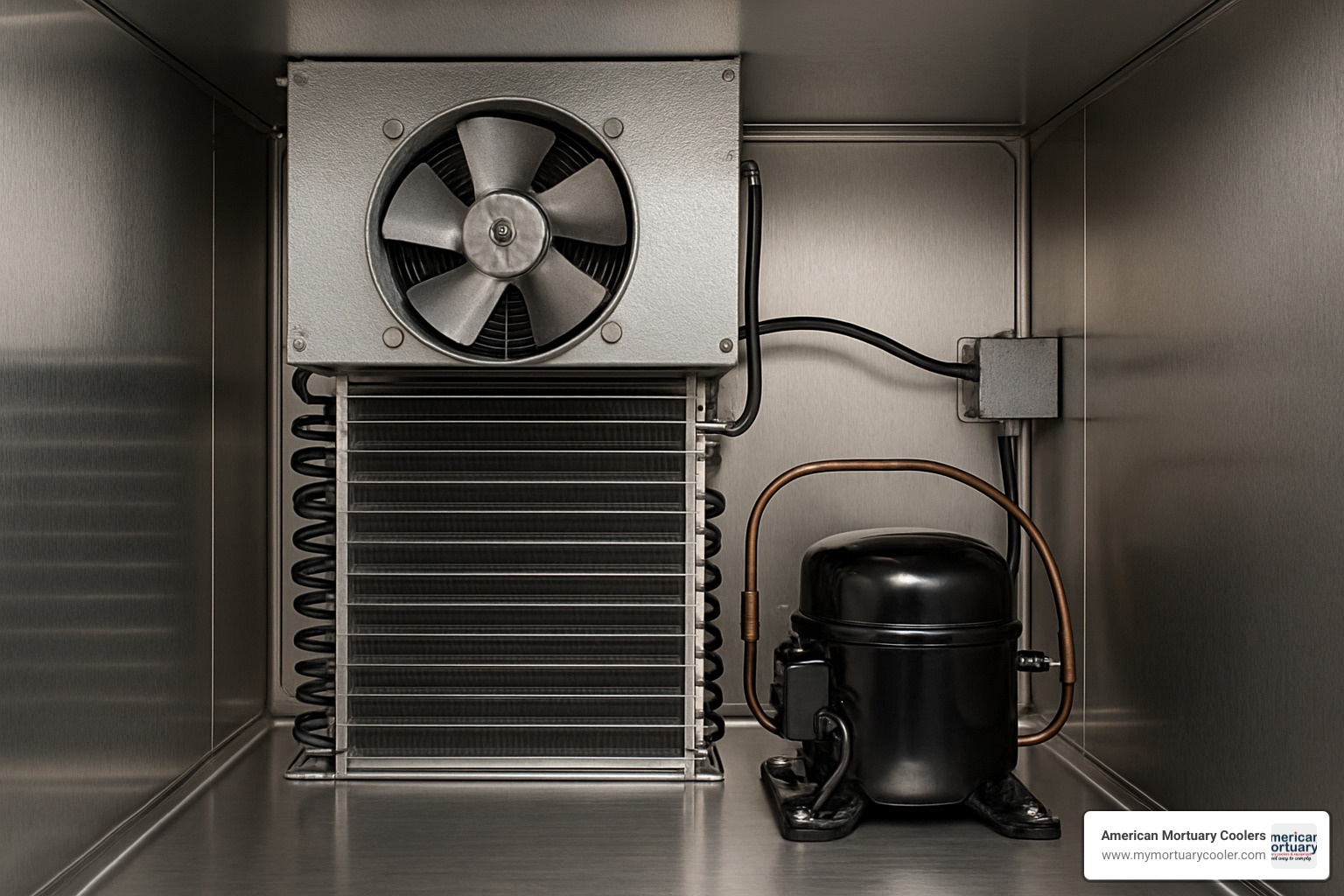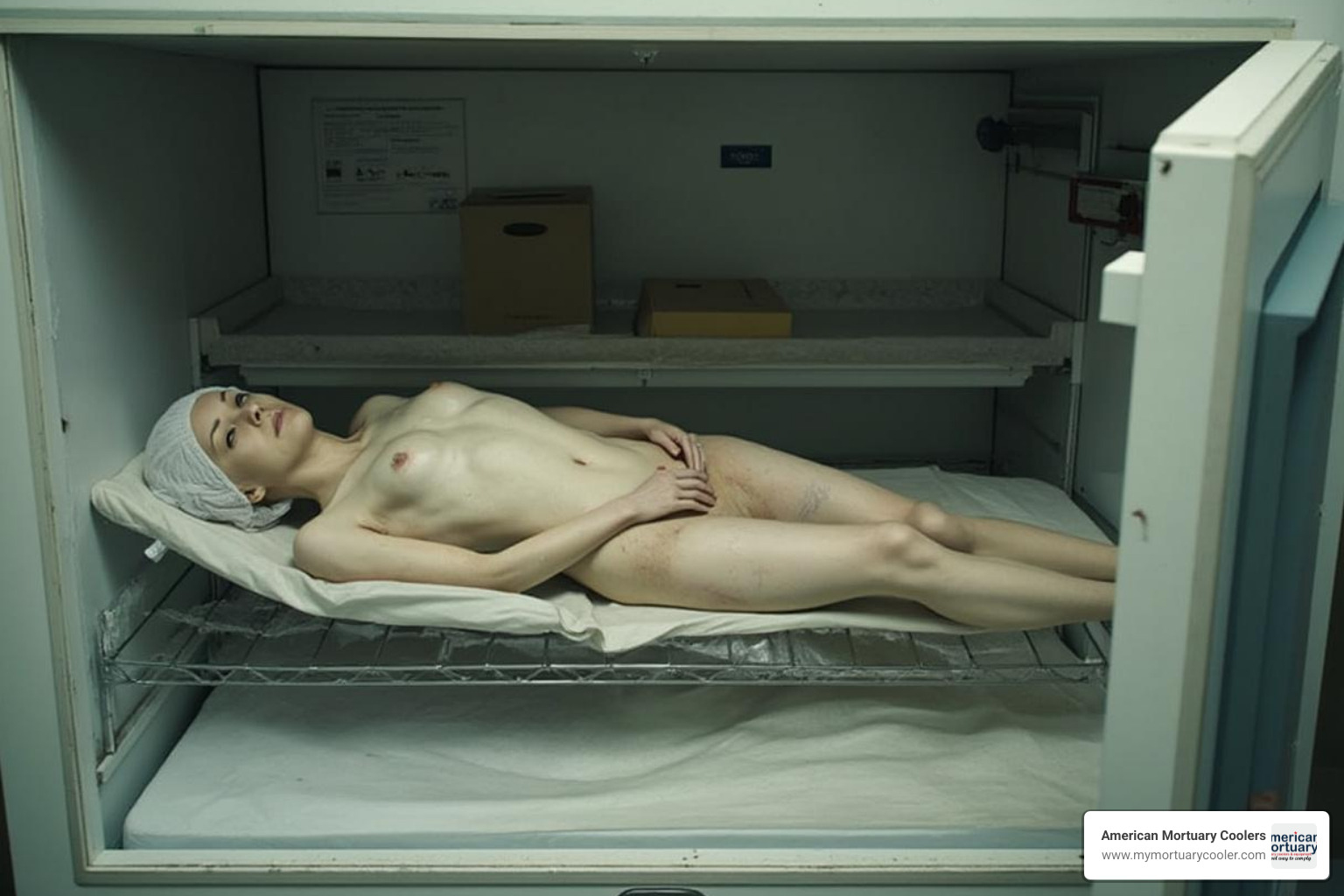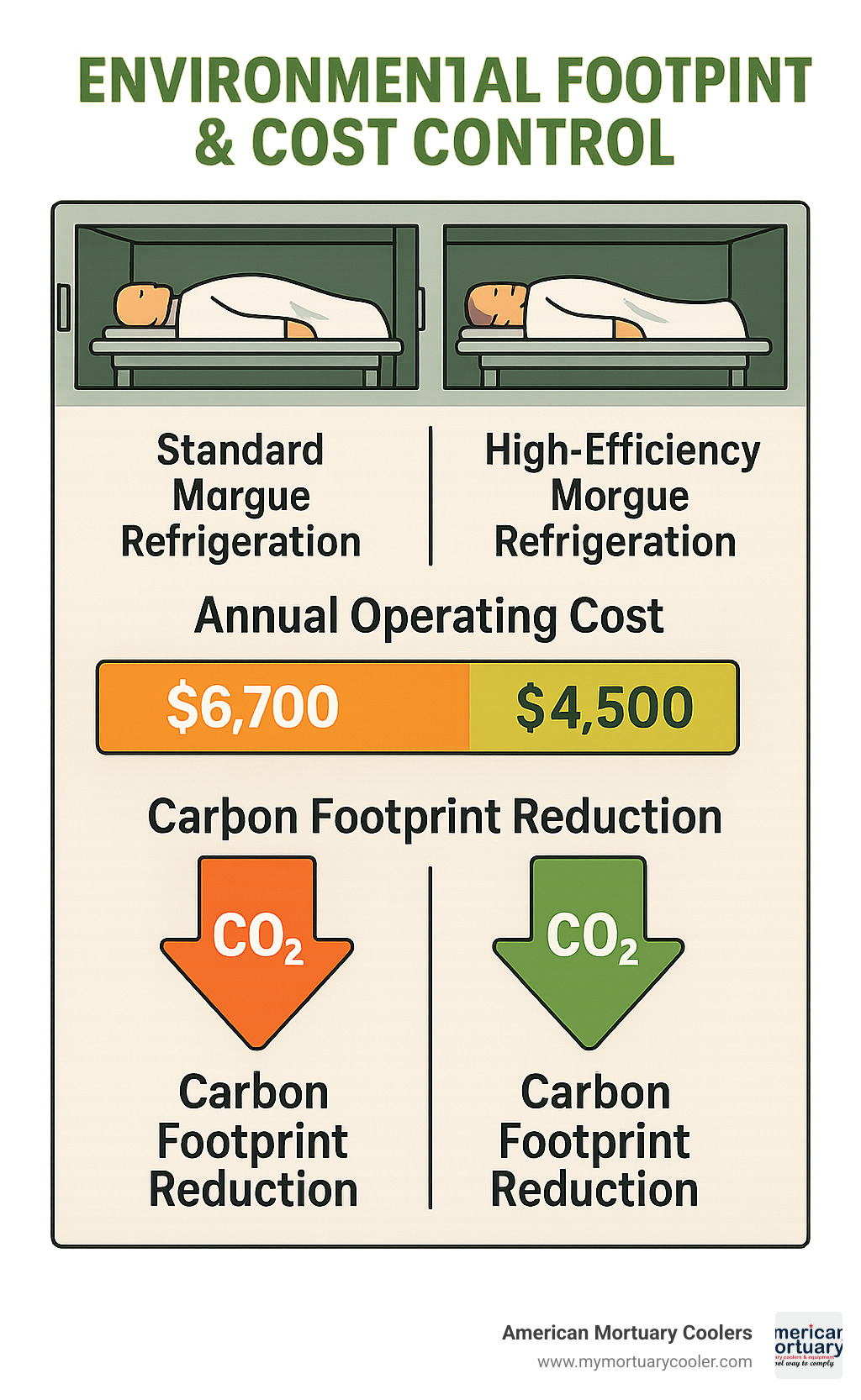Why Body Storage in Morgue Fridges Is Essential for Modern Funeral Operations
Body in morgue fridge storage gives funeral teams the strictly controlled cold environment required to slow decomposition, protect public health, and let families arrange services without feeling rushed. Knowing how these units work helps directors choose equipment that supports both dignity and day-to-day efficiency.
Key Facts About Body Storage in Morgue Fridges:
- Temperature Range: Standard morgue fridges operate between 2 °C to 4 °C (36 °F to 39 °F)
- Storage Duration: Bodies can be preserved for 4–6 weeks in positive-temperature units
- Freezer Storage: Negative-temperature units (-10 °C to ‑50 °C) can preserve remains for months or years
- Capacity Options: Available from single-body units to walk-in systems holding 50+ bodies
- Construction: Typically feature 4-inch polyurethane insulation and stainless-steel interiors
Cold storage does more than chill a room. By continuously pulling heat out through a vapor-compression cycle and circulating 2 °C air around the body, the system suppresses bacterial growth and chemical breakdown so remains stay viewable for weeks.
After installing hundreds of units nationwide, the American Mortuary Coolers team has seen how dependable refrigeration streamlines workflow and lifts the care families experience.

How Morgue Fridges Work & Why Temperature Matters

When you open a morgue fridge, you're looking at the result of sophisticated engineering. The technology behind body in morgue fridge storage might seem simple on the surface, but there's actually a lot happening to keep everything at just the right temperature.
Think of it like your kitchen refrigerator, but built for a much more important job. The basic principle is the same - a vapor-compression cycle that moves heat from inside the storage area to outside. But morgue fridges are engineered to handle the unique challenges of preserving human remains with absolute reliability.
Here's how it works: The compressor pressurizes refrigerant gas, which then flows to the condenser where it releases heat and turns into liquid. This liquid refrigerant passes through an expansion valve and enters the evaporator coils inside the storage chamber. As it absorbs heat from the environment, it turns back into gas and the cycle repeats.
The magic happens in the temperature ranges. Positive temperature storage runs between 2°C to 4°C (about 36°F to 39°F). This range dramatically slows decomposition and can preserve bodies for 4 to 6 weeks in most cases. It's perfect for typical funeral home operations where families need time to make arrangements.
Negative temperature storage is a different beast entirely. Running from -10°C to -50°C, these freezer units can preserve remains for months or even years. They're essential for forensic institutes, medical schools, and situations involving unidentified remains.
The construction details matter more than you might think. Those 4-inch polyurethane insulation panels aren't just for show - they provide superior thermal retention that keeps temperatures stable even during power fluctuations. The stainless steel interiors make cleaning easier and resist the harsh chemicals used for sanitization.
Modern units come with digital controllers and alarm systems that alert staff immediately if temperatures drift outside safe ranges. When you're dealing with something this important, there's no room for guesswork.
Cooling Technology Inside a Body in Morgue Fridge
The evaporator fans ensure cold air circulates evenly throughout the storage chamber. Without proper airflow, you'd end up with hot spots and cold spots - and that's not acceptable when preservation quality matters.
Condenser units typically live outside the storage area, where they can efficiently reject heat from the refrigeration system. Today's units use environmentally friendly refrigerants like R134a or R404a, which cool effectively while reducing environmental impact.
Antimicrobial surfaces have become standard in quality morgue fridges. These specialized coatings actively fight bacterial growth on interior surfaces, adding an extra layer of protection for both the deceased and facility staff.
Humidity control systems prevent moisture buildup that could compromise preservation or create unsanitary conditions. Proper ventilation and dehumidification maintain the optimal storage environment.
Capacity & Configurations
Modern morgue refrigeration offers incredible flexibility in both size and design. Walk-in cold rooms provide maximum storage capacity, accommodating anywhere from 5 to 50+ bodies using cantilever rack systems. These rooms are built with modular panels that can be customized to fit almost any space.
Body box refrigerators offer more compact solutions for smaller facilities. These units range from 2 to 23 body capacity and come in several smart configurations. Side-load units work perfectly in tight spaces where door swing matters. Roll-in refrigerators let you wheel gurneys directly into the unit, saving time and reducing handling. Bariatric units are specially designed for oversized remains, while standard models come in 2-tier, 3-tier, or 4-tier configurations.
The modular panel construction of modern morgue fridges means you can assemble, disassemble, and relocate these units when your facility needs change. This flexibility has saved many funeral homes significant money during expansions or relocations.
At American Mortuary Coolers, we build custom configurations right here in Tennessee and deliver them directly across the contiguous 48 states. Every facility has unique needs, and we've found that custom solutions often work better than trying to fit a standard unit into an unusual space.
How Long Can a Body in Morgue Fridge Last?

Proper refrigeration extends preservation far beyond what most people expect.
- Immediate storage (6–72 h): Near-freezing temperatures prevent visible change while paperwork begins.
- Extended storage (2 °C–4 °C): Remains normally stay in good condition for 4–6 weeks, providing time for travel, legal matters, or scheduling.
- Frozen storage (-10 °C to ‑50 °C): Used mainly by forensic or teaching facilities, this range can keep bodies identifiable for months or even years.
Refrigeration slows autolysis, bloating, and active decay, yet does not stop them entirely. Autopsied bodies often last longer because gut bacteria are removed.
Factors That Influence Storage Duration
- Precise, stable temperature control
- Body condition and extent of trauma
- Packaging, humidity, and power redundancy
- Autopsy status (often extends time)
More info about storage factors
Comparison With Other Preservation Methods
Embalming allows room-temperature viewing but introduces chemicals. Dry ice is short-term and labor-intensive; formalin suits lab specimens; and cryonics remains experimental. Refrigeration offers a chemical-free, culturally flexible, cost-effective balance ideal for identification and dignified storage.
Legal, Ethical & Procedural Protocols for a Body in Morgue Fridge

When you're managing a body in morgue fridge, you're not just dealing with refrigeration technology. You're navigating a complex web of legal requirements, ethical obligations, and procedural protocols that protect everyone involved - the deceased, their families, and your staff.
The moment remains enter your morgue refrigeration, the chain of custody documentation begins. Every single person who accesses that storage area gets logged. Every time someone opens a door, handles remains, or performs any procedure, it all goes on record. This isn't just bureaucratic paperwork - it's your protection in legal proceedings and the family's assurance that their loved one received proper care.
Next-of-kin rights and consent issues become particularly important during extended refrigerated storage. While your morgue fridge can preserve remains for weeks or months, families generally have the right to claim their loved ones within reasonable timeframes. Most jurisdictions require you to make notification attempts before extending storage periods significantly.
Public health codes don't mess around when it comes to morgue refrigeration standards. They mandate specific temperature ranges, detailed cleaning protocols, and comprehensive safety measures. OSHA gets involved too, requiring safety release handles on all refrigerated units. These handles must be accessible from inside the unit and clearly marked - because the last thing anyone wants is a worker accidentally trapped in a morgue fridge.
Environmental regulations also impact your operations. You'll need to comply with rules governing refrigerant disposal and energy efficiency standards. Modern morgue fridges use CFC-free refrigerants and meet strict environmental standards for both daily operation and eventual disposal.
Unclaimed or Unidentified: What Happens Next?
Sometimes a body in morgue fridge storage becomes a long-term situation when remains go unclaimed or can't be identified. When this happens, specific legal protocols kick in that can keep your refrigeration units occupied for months or even years.
The NamUs database (National Missing and Unidentified Persons System) becomes your primary tool for attempting identification. This requires comprehensive documentation including full autopsy or external examination records, complete dental charting and X-rays, full-body CT scans when possible, DNA sampling for genetic comparison, and fingerprinting when tissue condition allows.
Here's something that surprises many funeral directors: the law prohibits cremation of unidentified bodies. This regulation predates modern DNA analysis capabilities but remains firmly in effect. That means refrigerated storage becomes your only viable long-term option for unidentified remains.
Extended storage periods for unidentified remains can stretch for years. We've seen cases where bodies remained in morgue refrigeration for over three years while awaiting identification. The financial burden typically falls on the county or state, making efficient, reliable morgue refrigeration systems essential for controlling ongoing costs while maintaining dignity for the deceased.
County responsibilities vary by jurisdiction, but most require the sheriff or medical examiner to handle disposition of unclaimed remains. For unclaimed bodies with established identity, low-cost cremation typically occurs once next-of-kin notification attempts are exhausted.
Scientific research on unidentified decedents
Mass-Casualty & Disaster Scenarios
During mass-casualty events, your standard morgue refrigeration capacity can disappear overnight. The COVID-19 pandemic taught many facilities this lesson the hard way, with death rates exceeding normal morgue capacity for months at a time.
Emergency protocols must address surge capacity while maintaining proper storage conditions for all remains. Temporary refrigeration solutions become critical, including mobile refrigerated trailers, pop-up cooler systems like AirCool units, emergency generator-powered backup systems, and coordination agreements with neighboring facilities.
Triage and identification procedures take on new urgency when refrigeration space runs short. You'll need priority systems to determine which remains require immediate attention versus those that can be safely stored longer-term in your available morgue fridge space.
FEMA guidance provides valuable frameworks for disaster mortuary operations, covering everything from refrigeration requirements to resource allocation strategies. These protocols help communities prepare for events that completely overwhelm normal morgue capacity.
The pandemic experience highlighted something we've always known at American Mortuary Coolers: reliable, expandable morgue refrigeration systems aren't just equipment purchases - they're community preparedness investments. When disaster strikes, having dependable body in morgue fridge storage can mean the difference between maintaining dignity for the deceased and facing an impossible situation.
Owning & Operating a Morgue Fridge: Maintenance, Energy & Upgrades
Keeping your morgue refrigeration system running smoothly isn't just about flipping a switch and walking away. These specialized units require thoughtful care to ensure they're ready when families need them most. The good news? With the right maintenance approach, modern morgue fridges can provide decades of reliable service for body in morgue fridge storage.
Daily care starts simple - check those temperature readings, take a quick look at door gaskets for wear, and give interior surfaces a proper cleaning with antimicrobial solutions. Your alarm systems deserve a quick test too. These small daily steps prevent big problems down the road.
Weekly deep cleaning goes beyond the basics. This is when you'll want to use those specialized sanitizers that keep bacterial growth at bay. Check your condensate drains (nobody wants water backing up), test backup systems, and review your documentation.
Monthly professional attention keeps the heart of your system healthy. Compressor inspection and service, refrigerant level checks, and electrical connections all need regular attention. Temperature controller calibration ensures your system maintains those critical 2-4°C temperatures that preserve remains properly.
Modern systems make this easier than ever. Today's morgue fridges use environmentally friendly refrigerants like R134a and R404a - these "green" options cool efficiently while meeting strict environmental standards.
Energy Star certified units might cost more upfront, but they'll save money month after month through improved insulation, efficient compressors, and LED lighting. Think of it as an investment that pays dividends - often for decades.
Digital controllers and alarm systems act like vigilant guardians, watching temperatures around the clock and alerting staff to any problems. Data loggers maintain the records health departments require while giving you peace of mind that everything's working properly.
At American Mortuary Coolers, we stand behind our custom systems with comprehensive maintenance support. Our Tennessee-based team understands that reliable morgue refrigeration isn't optional - it's essential for serving families with dignity.
Environmental Footprint & Cost Control

Running a morgue fridge doesn't have to break the bank or harm the environment. Smart choices in equipment and operation can dramatically reduce both your costs and environmental impact while maintaining excellent preservation conditions.
High R-value insulation makes the biggest difference in energy efficiency. Those thick 4-inch polyurethane panels we use aren't just for show - they keep cold air where it belongs, reducing the workload on your refrigeration system. Better insulation means lower electric bills, month after month.
LED lighting systems slash energy consumption by up to 75% compared to old fluorescent fixtures. They also last longer, produce better light, and generate less heat - which means your cooling system doesn't have to work as hard.
Door heater efficiency improvements prevent frost and condensation without wasting energy. Modern heated door frames use smart controls that only activate when needed, rather than running constantly like older systems.
Solar-ready compressor systems open up exciting possibilities for renewable energy integration. Some forward-thinking facilities have achieved remarkable savings by combining efficient morgue refrigeration with solar power generation.
Lifecycle ROI calculations tell the real story about equipment costs. While high-efficiency systems cost more initially, they typically pay for themselves through energy savings within 5-7 years. After that, it's pure savings - sometimes for decades.
Grant funding opportunities exist for facilities upgrading to more efficient systems, especially public health facilities and rural hospitals. These programs recognize that reliable, efficient morgue refrigeration serves the entire community.
The math is simple: efficient equipment costs less to operate, lasts longer, and helps protect the environment. For facilities committed to long-term success, investing in quality morgue refrigeration makes both financial and environmental sense.
Frequently Asked Questions About Body in Morgue Fridge
When it comes to body in morgue fridge storage, we hear the same questions from funeral directors across the country. After years of helping facilities choose and maintain their refrigeration systems, we've learned that understanding these basics helps everyone make better decisions for their operations and the families they serve.
How cold is a morgue fridge supposed to be?
Most morgue fridges run between 2°C to 4°C (that's 36°F to 39°F for those of us still thinking in Fahrenheit). This temperature range hits the sweet spot for body preservation - cold enough to slow decomposition significantly, but not so cold that it damages tissues or makes identification difficult.
Think of it like your kitchen refrigerator, but with much more precise temperature control. The difference between 2°C and 6°C might not seem like much, but it can mean the difference between good preservation and accelerated decomposition.
For special situations, forensic facilities often use negative temperature storage ranging from -10°C to -50°C. These freezer-cold temperatures are typically reserved for long-term storage of unidentified remains or cases requiring extended preservation for legal reasons.
The key is consistency. A morgue fridge that bounces between 1°C and 8°C won't preserve bodies as well as one that holds steady at 3°C. That's why we always recommend systems with reliable digital controllers and backup alarms.
How long before a refrigerated body needs embalming?
Here's where proper refrigeration really shines. A body in morgue fridge storage at the right temperature can typically go 4-6 weeks without embalming while maintaining good condition. That's a game-changer for families who need time to make arrangements or for facilities managing their workflow.
The timeline depends on several factors, though. Bodies in excellent condition at the time of death often preserve better than those who experienced trauma or illness. Natural deaths typically give you more time than traumatic cases.
Viewing requirements often drive the embalming decision more than preservation needs. If the family wants an open-casket service after a week in refrigeration, embalming usually provides better results for presentation. But for direct burial or cremation, that 4-6 week window gives everyone plenty of time to make arrangements without rushing.
Weather can play a role too. During busy periods or when transport is delayed, that extended refrigeration time becomes invaluable. We've seen facilities handle complex cases that stretched several weeks, all because they had reliable refrigeration systems.
Can a body be frozen indefinitely without damage?
The word "indefinitely" is where we need to be honest about the science. While freezing at negative temperatures can preserve bodies for months or even years, nothing lasts forever - not even in a freezer.
Forensic facilities have successfully preserved remains for several years using proper frozen storage. We know of cases where unidentified bodies remained in excellent condition after three or more years in negative temperature storage. That's remarkable preservation that simply isn't possible without proper refrigeration.
Freezer burn and cellular damage do occur over extended periods, but much more slowly than decomposition at higher temperatures. The tissues gradually dehydrate and can become brittle, but the overall structure remains intact for identification purposes.
The practical reality is that most bodies don't need indefinite storage. Even complex legal cases or unidentified remains typically get resolved within months or a few years. The key is having reliable refrigeration systems that can maintain consistent temperatures for however long storage is needed.
From our experience helping facilities across the country, the most important factor isn't how long a body can be stored, but having equipment reliable enough to maintain proper conditions for as long as necessary. That's where quality refrigeration systems really prove their worth.
Conclusion
When it comes to body in morgue fridge storage, we've covered a lot of ground together. From understanding the basic science of how refrigeration preserves human remains to navigating the complex web of legal requirements and maintenance protocols, proper morgue refrigeration truly forms the backbone of modern funeral operations.
The peace of mind that comes with reliable refrigeration cannot be overstated. Families deserve time to grieve and make thoughtful decisions without the pressure of deteriorating conditions. A well-functioning morgue fridge provides that precious gift of time while maintaining the dignity their loved ones deserve.
Technology in this field keeps getting better, which is wonderful news for funeral professionals. Today's morgue fridges are more energy-efficient than ever before, with smart controls that alert you to problems before they become disasters. The environmental impact has improved dramatically too, with green refrigerants and better insulation making these systems more sustainable.
What we find most exciting is how flexible modern systems have become. Whether you're running a small family funeral home that needs a compact 2-body unit or managing a busy hospital morgue requiring walk-in capacity for dozens of remains, there's a solution that fits your exact needs.
At American Mortuary Coolers, we've seen how the right refrigeration system transforms funeral operations. Our Tennessee-based team takes pride in crafting custom mortuary coolers that meet the exacting standards this industry demands. We're not just selling equipment – we're providing the reliable foundation that lets funeral professionals focus on what matters most: caring for families during their most difficult moments.
The investment in quality morgue refrigeration pays for itself in ways that go beyond dollars and cents. Yes, you'll see savings in energy costs and reduced maintenance headaches. But the real value comes from operational confidence – knowing your refrigeration system will perform flawlessly when families are counting on you.
Whether you need direct delivery across the contiguous 48 states or custom modifications for unique space requirements, we're here to help. Because when it comes to body in morgue fridge storage, reliability isn't just important – it's everything.
















